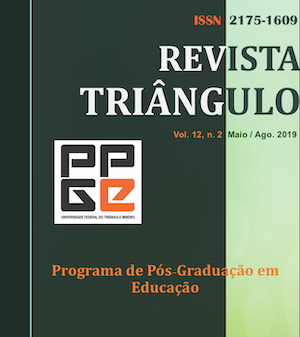THE SENSE OF PLAY IN CHILDREN EDUCATION AND FUNDAMENTAL EDUCATION: AN ANALYSIS ABOUT THE NATIONAL COMMON CURRICULUM BASIS
DOI:
https://doi.org/10.18554/rt.v0i0.3466Keywords:
Game. National Common Curriculum Basis. Childhood Education. Fundamental Education.Abstract
The purpose of this research was to identify the meaning of the Game, which is based on the National Common Curriculum Basis (BNCC), on Early Childhood Education and on the different curricular components of Fundamental Education - initial years and final years. For this, a qualitative documentary analysis was carried out, through which it was verified that in Childhood Education, the Game is considered as a structuring axis for the development of children's learning and skills, and it should be worked through teaching stage. In Fundamental Education, depending on the curricular component, it presents itself as content with an end in itself, as in Physical Education and Art; as a means (methodology) to teach the specific contents of each subject, being present in the skills to be developed by them (Portuguese Language, English Language, Geography, History and Religious Education); or is still absent, as well as in Mathematics and Science. Thus, the culture of the Game, as a social construction, needs to be experienced in a certain time and space, taking into account its importance in the development of the individual during childhood and adolescence, anchored by educational documents such as BNCC, in which determines, guides and guides the pedagogical practices of Basic Education.References
BRASIL. Constituição da República Federativa do Brasil. Brasília: Senado, 1988.
______. Lei de Diretrizes e Bases da Educação Nacional. Brasília: DF, 1996.
______. Ministério da Educação. Base Nacional Comum Curricular. Brasília, 2018. Disponível em: <http://basenacionalcomum.mec.gov.br/a-base>.
______. Ministério da Educação. Base Nacional Comum Curricular. Proposta preliminar. Segunda versão. Brasília, 2016. Disponível em: <http://portal.mec.gov.br/dmdocuments/rceb007_10.pdf>.
______. Ministério da Educação. Base Nacional Comum Curricular. Proposta preliminar. Terceira versão. Brasília, 2017. Disponível em: <https://web.moderna.com.br/documents/3901628/0/BNCC+-+Material+para+o+professor/01f4c4f9-7774-4e0d-bedb-565635b3294c>.
HUIZINGA, J. Homo Ludens: o jogo como elemento da cultura. 5. ed. São Paulo: Perspectiva, 2007.
KUNZ, E. Brincar e Se-movimentar: tempos e espaços da vida da criança. Ijuí: Unijuí, 2017.
PIMENTEL, A. O método da análise documental: seu uso numa pesquisa historiográfica. Cadernos de Pesquisa, São Paulo, n. 114, p. 179-195, 2001. ISSN 0100- 1574. Disponível em: <http://www.scielo.br/pdf/cp/n114/a08n114.pdf>.
RICHARDSON, R. J. Pesquisa social: métodos e técnicas. 3. ed. São Paulo: Atlas, 1999.
SÁ-SILVA, J. R.; ALMEIDA, C. D.; GUINDANI, J. F. Pesquisa Documental: pistas teóricas e metodológicas. Revista Brasileira de História & Ciências Sociais, Rio Grande, Ano I, n. 1, p. 01-15, 2009. ISSN 2175-3423. Disponível em: <https://www.rbhcs.com/rbhcs/article/view/6>.
SILVA, W. R.; GUIMARÃES, E. V.; MEDEIROS, I. A. Construção de objetos de conhecimento para aulas de Língua Portuguesa na abordagem do letramento científico. Revista Brasileira de Linguística Aplicada, Belo Horizonte, v. 18, n. 1, p. 159-191, 2018. ISSN 1984-6398. Disponível em: <http://www.scielo.br/pdf/rbla/v18n1/1984-6398-rbla-18-01-159.pdf>.
SOCZEK M. E. Os Jogos Cênicos de improvisação e a Escola. out. 2010. Disponível em: <http://educa29.blogspot.com/2010/10/os-jogos-cenicos-de-improvisacao-e.html>. Acesso em: 28 maio. 2018.
TEZANI, T. C. R. O jogo e os processos de aprendizagem e desenvolvimento: aspectos cognitivos e afetivos. Educação em Revista, Marília, v. 7, n. ½. p. 1-16, 2006. ISSN: 1518-7926. Disponível em: .
Downloads
Published
How to Cite
Issue
Section
License
Autores que publicam nesta revista concordam com os seguintes termos: Autores mantém os direitos autorais e concedem à revista o direito de primeira publicação, com o trabalho simultaneamente licenciado sob a Licença Creative Commons Attribution que permite o compartilhamento do trabalho com reconhecimento da autoria e publicação inicial nesta revista.




